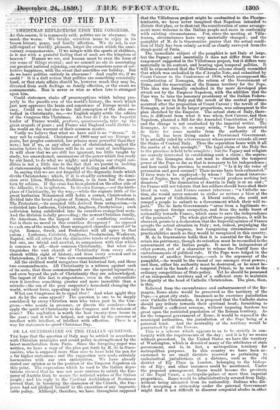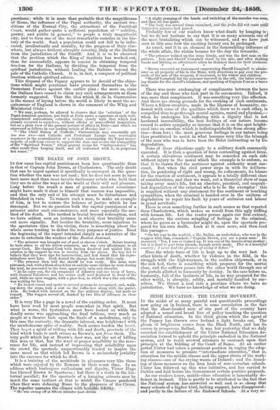DE LA GUEItRONIERE ON THE ITALIAN QUESTION. TBE hope that
the question of Italy may be settled in accordance with Christian principles and sound policy is strengthened by the latest manifestation from Paris. Since the foregoing paper was written, we have a copy of the plan put forth by M. de la Guer- roniere, who is supposed more than once to have held the pen for a far higher statesman ; and the suggestion now made certainly harmonizes with our own anticipation. We have already stated our opinion as to the position of the Emperor Napoleon on this point. The expressions which he used to the Italian depu- tations showed that he was not more anxious to satisfy the Em- peror of Austria than to secure the national wishes of the Italian people ; and his reply to the Cardinal Archbishop of Bordeaux proved that, in becoming the champion of the Church, the Em- peror had not pledged himself to the execution of any impracti- cable policy. Although, therefore, we have throughout supposed
that the Villafranea project might be sunbmitted to the Plenipo- tentiaries, we have never imagined that Napoleon intended to dictate that plan, or to shut out the consideration of some arrange- ment more welcome to the Italian people and more in conformity with existing circumstances. For, since the meeting at Villa- franca, circumstances have very materially changed ; and the pamphlet of M. de la Guerroniere proves that the actual condi- tion of Italy has been calmly as well as clearly surveyed from the stand-point of Paris.
The immediate subject of the pamphlet is not Italy at large, but the Papacy ; and essentially it does not differ from the ar- rangement suggested in the Villafranea project, but it differs very materially in its context, and bearing upon temporal politics. It will be remembered that the Villafranea scheme closely resembled that which was embodied in the d'Azeglio Note, and submitted by Count Cavour to the Conference of 1856, which presupposed the secularization of Romagna, the reform of the Government of Rome, and the reservation of the Roman territory for the Pope. This idea was formally embodied in the more developed plan struck out by the Emperor Napoleon, with the addition that the Pope was to take the honorary presidency of the Italian Federa- tion. The war in Italy and the revolt of the central provinces occurred after the proposition of Count Cavour ; the revolt of the Romagna, at least in its larger proportions, was subsequent to the plan sketched by the Emperor. The actual state of Italy, there- fore, is different from what it was when, first Cavonr, and then Napoleon, planned a Bill for the Amended Constitution of Italy ; and the change is not overlooked by the imperial writer. The Romagna, he says, in so many words, " has been separated de facto for some months from the authority of the Pope. It has been living under a Provisional Government. It is actually ruled by a Government whose power extends all over the States of Central Italy. Thus the separation bears with it all the marks of a fait accompli," The legal claim of the Holy See to the province is held to be complete ; but the Papacy and religion are scarcely interested in establishing such a claim ; the separa- tion of the Romagna does not tend to diminish the temporal power of the Pope so far as that is necessary to his independence ; and how could the province be restored ? " Is it by the voice of persuasion and good. counsel ? These means have been exhausted." If force were to be employed—by whom ? The armed interven- tion of Naples, were it practicable, " would produce nothing but disasters." " The domination of Austria in Italy is at an end ; " for France will not tolerate that her soldiers should have shed their blood in vain. And France cannot intervene : " a Catholic na-
tion, she would never consent to strike so serious a blow at the moral power of Catholicism. A liberal nation, she could not
compel a people to submit to a Government which their will re- jects." The de facto Governments " arose from a legitimate re- action against foreign occupation, and from the noble burst of nationality towards France, which came to save the independence of the peninsula." The whole gist of these propositions, it will be observed, points to a declaration that the Imperial opinion of France accepts the actual situation in Italy ; not, indeed, prejudging the decision of the Congress, but recognizing circumstances and practicabilities much as they would be recognized in this country. M. de la Guerroniere holds that it is essential for the Pope to retain his patrimony, though its retention must be reconciled to the contentment of the Italian people. It must be independent of other powers, yet of a character to release the Pontiff from the embarrassments of political rule. If the Pope were lodged in the territory of another Sovereign,—such is the argument of the
pamphlet,---he would be the vassal of one amongst rival powers ; and then, either his authority must be destroyed, or he must be- come a tool in the hands of a temporal Prince, to be used in the ordinary competitions of State policy. Yet he should be possessed of an independent territory and of a sufficient state to maintain his dignity at the head of Catholic Christendom. The plan, then, is this.
Relieved from the encumbrance and embarrassment of the Ro- magna, Rome alone would be preserved as the territory of the Pope,—a great city state. Inasmuch as he exercisesjurisdiction over Catholic Christendom, it is proposed that the Catholic states should pay tribute towards their spiritual head ; furnishing to the Pontiff a sufficient revenue, without imposing burdens too great upon the restricted population of the Roman territory. As for the temporal government of Rome, it would be reposed in the municipal authorities, the jurisdiction of the Pope being of a paternal kind. And the neutrality of the territory would be guaranteed by all the Powers. This is a scheme which appears to us to be strictly in con- formity with the requirements of the day ; and it is by no means without precedent. In the United States we have the territory of Washington, which is devoid of many of the attributes of state government, and is, in fact, a metropolitan territory for metropolitan purposes. In this country we have been ac- customed to see small districts reserved as pertaining to ecclesiastical jurisdictions at a distance, such as the old district of Ely Place in London, belonging to the bishop- ric of Ely ; and other instances could be mentioned. Under the proposed arrangement, Rome would become the precincts
of the Papal Court, a metropolis-palace of more than imperial proportions. Rome would be administratively severed from Italy, without being alienated from its nationality. Italians who dis- liked accepting a citizenship under the paternal Government might find it not difficult to discover congenial abodes in. other
provinces; while it is more than probable that the magnificence of Rome, the influence of the Papal authority, the ancient tra- ditions of the Eternal City, the attractions of the Pontifical Court, would gather quite a sufficient population of " nobility, gentry, and public in general," to people a truly magnificent city, and- to form one of the most remarkable societies in the his- tory of the world. Such a population could not fail to be influ- enced, intellectually and morally, by the progress of Italy else- where, but always without abruptly severing Italy or the Italians from the jurisdiction of the Pontiff. And it is to be observed that the problem which the King of Sardinia has worked. out, thus far successfully, appears to consist in obtaining temporal freedom for the Italians, by dividing the temporal from the spiritual jurisdiction, without leading the Italians beyond the pale of the Catholic Church. It is, in fact, a conquest of political freedom without spiritual schism.
This disposal of the Papacy appears to be devoid of the objec- tions which might perchance have presented themselves to the Protestant Powers against the earlier plan ; the more so, since the Italians have ceased to claim any such arrangements as those formerly suggested. That the idea which M. de la Guerroniere is the means of laying before the world is likely to meet the ac- quiescence of England is shown in the comment of the Whig and Ministerial Globe : " We may, perhaps, be allowed to observe that the `solution' of the Papal-temporal question, put forth at Paris under a signature of such well- remembered antecedents, coincides rather closely with that which had already occurred to ourselves, without official or semi-official inspiration, but on a plain view of the present posture of affairs in Italy—and which we expressed as follows in our leading article of Monday last :— " The Chief Bishop of 'Catholic' Christendom may reasonably ask .for woo on-co—and Catholic and Protestant Europe may reasonably acquiesce in the neutralisation of a district surrounding the Papal metro- tropolis of sufficient extent to support the state and secure the tranquillity of the " Spiritual Power," whose present recipe for "independence " has other result than keeping itself, and all concerned with it, in perpetual hot water.' "































 Previous page
Previous page